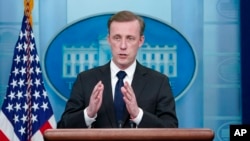Efforts to expand Arab-Israeli ties were raised in a meeting in Jerusalem Thursday between U.S. national security adviser Jake Sullivan and Israeli Prime Minister Benjamin Netanyahu.
Sullivan was the first senior Biden administration official meeting with Netanyahu since he was sworn in last month to lead a coalition that has been described as the most right-wing in the country’s history.
The two men discussed joint efforts to halt the Iranian nuclear program and steps to deepen the Abraham Accords “with emphasis on a breakthrough regarding Saudi Arabia,” according to a statement from Netanyahu’s office.
The Abraham Accords is a deal pushed by the administration of former President Donald Trump that normalized diplomatic relations between Israel and its Arab neighbors Bahrain and the United Arab Emirates in 2020. Morocco and Sudan followed shortly after.
Sullivan also met Thursday with his counterparts from Israel, the Emirates and Bahrain to discuss ways of enhancing cooperation among the four countries, and “support for expanding normalization to other countries, including Saudi Arabia,” a National Security Council spokesperson told VOA in a statement.
Sullivan’s meeting with Israeli officials is crucial as the Biden administration seeks to establish a working relationship with a key ally whose government now includes far-right parties, whose support secured Netanyahu’s return to power in an unprecedented sixth term as prime minister.
Continuing the Trump administration’s approach, Biden has urged deeper ties between Israel and its Arab neighbors. But the inclusion of far-right politicians such as Itamar Ben-Gvir, Bezalel Yoel Smotrich and Avi Maoz in Israel’s government is complicating efforts.
National security minister Ben-Gvir, an ultra-nationalist politician from the far-right Jewish Power Party, was previously convicted of ties to a racist anti-Arab organization. Smotrich, leader of the Religious Zionist Party who serves as finance minister and person in charge of West Bank policy under the Defense Ministry, is a longtime advocate against Palestinian statehood and supporter of settlement expansion. Maoz, who holds a post at the Education Ministry, campaigned on an anti-LGBT platform and wants increased gender segregation in public events.
“We look forward to working with Israel to advance the interests and values that have been at the heart of our relationship for decades. That includes a steadfast commitment to Israel’s security,” the NSC spokesperson said. “As [U.S.] Secretary [Antony] Blinken has said, we will engage with and judge our partners on the basis of the policies they pursue, not the personalities that form the government.”
However, these personalities have gone beyond discriminatory rhetoric to launching initiatives aimed at weakening Israel’s judiciary system, legalizing discrimination toward Arab Israelis and reducing the prospects for a two-nation peace deal with the Palestinians. Critics see these as signs that Netanyahu, who has been indicted in three separate corruption cases, may be unable to keep his “hands firmly on the steering wheel” of Israeli policy as he has repeatedly assured Washington.
“The democratic erosion that is taking place under the extreme government may trickle down and negatively impact the shared values between Israel and the U.S.,” Nimrod Goren, senior fellow for Israeli affairs at the Middle East Institute, told VOA.
There are already signs it has. Israeli media reported that the office of U.S. Senator Jacky Rosen, a Democrat, requested that a delegation of U.S. senators visiting Israel this week not meet with members of hard-line factions in the Israeli government. The senator’s office did not respond to VOA’s request for confirmation.
Provocations from Israel’s extreme factions could also spill over regionally, Goren said, beginning with a potential escalation between Israelis and Palestinians.
“The appetite of Arab countries who normalized relations with Israel in recent years to move forward with such an extreme government is less than it used to be,” he said.
All of this has the potential to create hurdles for Biden’s broader agenda in the Middle East, described by experts as a relatively hands-off approach to long-running regional conflicts as it attempts to focus on other priorities such as sustaining the coalition in support of Ukraine and the strategic rivalry with China.
It could also impact Biden’s standing domestically. Ahead of the 2024 presidential election, Republicans, who have just taken control of the House of Representatives, are keen to portray the president as not a friend to Israel — a crucial issue for conservatives and evangelical Christians who represent a sizeable bloc in the American electorate.
The White House would not confirm reporting by Axios that Sullivan raised the issue of Israel’s judicial overhaul and democratic backsliding with Israeli officials.
Saudi normalization
Most analysts say it’s a question of when rather than whether the Saudis will normalize relations. The administration has not shared details — understandably since open acknowledgments of ongoing negotiations may be counterproductive, said William Wechsler, senior director of the Rafik Hariri Center and Middle East Programs at the Atlantic Council.
“It increases the cost of what the Saudis might demand,” he told VOA. “If Riyadh understands that this is something that is desperately wanted by Bibi Netanyahu and desperately wanted by the United States, then they can charge a higher price.”
There have been signs of warming Saudi-Israel relations. Last July, Biden flew directly to Jeddah from Tel Aviv hours after the Saudi Kingdom ended the country’s ban on flights to and from Israel — a gesture from Riyadh as the Arab world aligns more closely with Israel against the threat from Iran.
Palestinians say their statehood cause has been sidelined by the Abraham Accords, which established diplomatic relations between Israel and Arab nations that had previously withheld such ties to pressure Israel for a two-state solution and better treatment of Palestinians in the territories it occupies.
The White House said Sullivan discussed preserving the path toward the two-state solution at his meeting in Ramallah with Palestinian Authority President Mahmoud Abbas.





